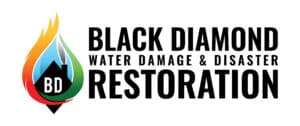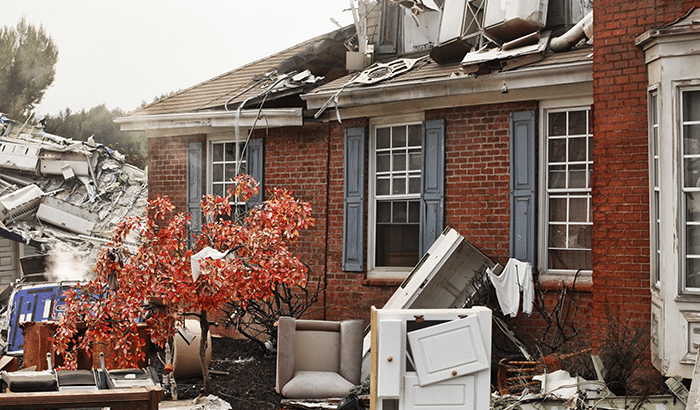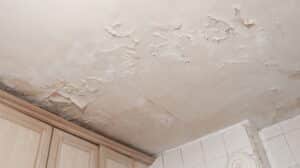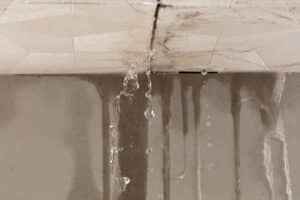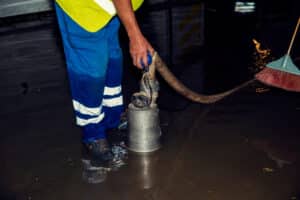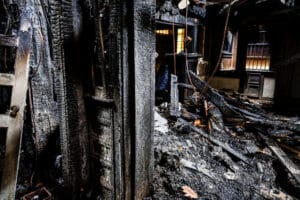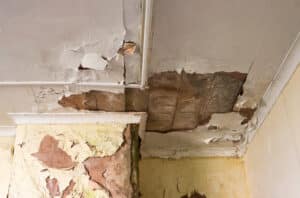Wind damage from a thunderstorm can wreak havoc on your home. Wind gusts can cause entire trees to collapse on your home or break glass windows. The damage can devastate your home and be costly to repair.
That’s why it’s essential to take preventative measures to protect yourself, your family, and your home from wind damage. Of course, you can’t prevent a storm from coming, but you can do your part to minimize its impact.
In today’s blog, we’re discussing how to minimize wind damage in a thunderstorm. There are steps you can take before and after a storm. Let’s dive in!
Proactive Protection for When It’s Not Storming
Did you know you can take steps to help protect your home and property from wind damage? However, you need to take these steps when a storm isn’t about to blow in. If a storm is on its way, please save these steps for another time. We don’t want you getting hurt!
Take Care of Your Trees
Has a tree or branch landed on your roof? This is highly dangerous, so you should evacuate your home. We highly recommend calling your local fire department. They’ll assess the damage and tell you if it’s safe to return to your home. You might need to stay somewhere else until a contractor repairs your home.
Tree branches are known for breaking off and damaging property. But did you know that maintaining your trees can prevent that from happening? Simple, regular maintenance can save you from catastrophic damage during a storm.
The key is to prevent trees from decaying. Decay severely weakens the trunks and limbs of trees, making it easier for the wind to uproot them and send them flying–quite literally.
The best ways to prevent decay are by mowing carefully around trees so that you don’t cut right into the trunk, not pruning too much, and not over-watering. It’s a common belief that trees can’t get enough water—this is untrue. Over-watering your trees can leave them with shallow root systems, which will weaken their defense against heavy winds.
Take Care of Your Roof
This step requires a ladder and getting on your roof; you should avoid doing this right before a storm. Once you’re on your roof, you’ll want to check your shingles. Do any shingles look loose? Are there any missing shingles? It’s also a good idea to make sure your flashings are in place.
Taking care of your trees and roof will give you peace of mind during a storm. Of course, there’s no way to protect your home or property from wind damage completely, but these steps greatly minimize how bad the damage can be. Because, trust us, you don’t want a tree branch crashing on your roof.
Right Before the Storm
If there’s going to be a thunderstorm with severe wind gusts, you’ll likely get a notification/warning on your phone. Some storms come out of nowhere, but meteorologists can often predict storms several days in advance. This is when you’ll want to take action. Waiting until after the storm could cause unnecessary damage.
These steps are easy to take and don’t require much time or planning, so they can be done if you don’t have much warning that a storm is coming.
So, what exactly should you do?
Protect Your Vehicles
First, protect your vehicles. If you have a garage, pull your car in. If you don’t have a garage, find a covered parking space or park your vehicle away from large objects that could crash on it during the storm. It’s also a good idea to protect your windshields and windows with a tarp.
There’s no guarantee that your car won’t suffer some damage, but taking these measures will minimize that damage.
Secure Outdoor Property
Do you have a grill? What about patio furniture or trash cans? These are all unsecured objects that could cause damage or get damaged by the wind. The best solution is to secure them by tying them down or bringing them inside, away from the wind.
After the Storm
Some wind damage can’t is inevitable, even when you’re super careful, so assessing damage after the storm is over is important.
Be sure to wait until the storm has passed, though. It can be tempting to look while it’s still raining outside, but this is dangerous. There could still be lightning strikes or heavy winds that could injure you.
Power Lines
It’s a good idea to watch your steps carefully when you step outside because there might be down power lines that could electrocute you. If you see a downed power line, you should stay far away and call your utility company right away.
Not only should you not touch those power lines, but you should stay far away from them. It would be best if you didn’t even touch nearby objects. They could carry an electric charge that could shock you.
Shingles
Check your roof for cracked, peeling, or missing shingles when it’s safe to do so. It would help if you also looked for water damage that could leak into your attic and cause mold problems.
Black Diamond Restoration
Did your home suffer wind damage from heavy winds in a recent thunderstorm? Contact Black Diamond Restoration today. We’re skilled in many areas, including storm damage. Our storm damage experts can assess smoke and primary and secondary storm damage. With their skills and experience, they’ll restore your home to pre-loss condition.
Not only do we have the experts you need to get back to everyday life, but we understand the urgency of your situation. You want to get back into your home as quickly as possible! Our storm damage experts will work hard to get you home.
Have questions? Need help getting started on repairs? Please don’t hesitate to contact us today. Black Diamond Restoration is located in Murray, Utah, and services the greater Salt Lake City area.
toto slot